On Instagram @AndreaHardyRD, I discuss the difference between bloating and distention and what causes both!
What is bloating?
Bloating is the FEELING of abdominal pressure, while distension is the visible expansion of your abdominal girth.
Is being bloated normal?
Both are normal, but if you’re frequently experiencing bloating and distension with abdominal pain and a lot of gas, it may be time to do something about it.
Why is my abdomen distended?
Interestingly, a series of studies over the past few years have been working on figuring out the CAUSE of distension, and it may not be what you think! Bloating from fermentation happens (or should happen) in the colon, where the majority of your bacteria live. Those bacteria break down what we can’t – fermentable carbohydrates! This creates gas, bloating and distension, and if the expansion is enough or you have IBS, can also trigger pain. This type of bloating typically takes place ~2-8 hours after you’ve eaten, depending on what you’ve eaten.
However, I frequently see in my practice, patients that complain of ‘instant’ bloating – within 15 minutes of eating, and usually not from consuming fermentable carbohydrates. Many times I see patients jump RIGHT to #SIBO as the culprit. BUT! Research suggests that is less likely to be the case. In fact, in a new 2019 study, they were able to show that those that experience frequent bloating and distension have bloating not from food, but uncoordinated abdominal wall muscles.
This was shown on CT after the participants ate lettuce, a poorly fermentable, bulky food. The study participants that experienced bloating and distension had an abnormal somatic response, triggering discoordination of the diaphragm and abdominal walls – meaning the diaphragm didn’t move up adequately to accomodate increased volumes.
Interestingly, With biofeedback therapy, the participants learned to control their abdominal muscles to reduce bloating and distension. This particular type of biofeedback is not available in my city, however we often have patients see pelvic floor physios to assess proper function of the pelvis and diaphragm.
Does food cause bloating?
BOTTOM LINE: It’s not always food that causes bloating and distension. Working with your dietitian and gastroenterologist to REALLY understand your bloat can help tease out the cause!
Why am I bloated after eating?
What does it mean when I experience bloating right after eating? Hint – it’s not FODMAPs!
Many times I see patients looking to what FODMAPs they JUST ate as a cause of their bloating symptoms. However, the effect of FODMAPs doesn’t really onset until the food leaves the stomach and mostly occurs in the colon, at least a few hours to up to 2 days (ish) after eating!
So then what does it mean if I experience bloating right after eating?
Commonly, it’s not what you JUST ate, but possibly, what you ate previously! Food journalling is a great place to start, because too many times I see patients restrict further, and further, and further, when it wasn’t even the food they just consumed triggering their symptoms to begin with!
However, there are conditions that contribute to that bloating feeling immediately after eating, that sometimes get chalked up to IBS, when in fact, they can be something else entirely.
This includes (to name a few):
- Visceral hypersensitivity (your gut sensing normal digestion as pain) or functional abdominal pain disorders
- Functional dyspepsia (think indigestion crossed with IBS for your upper gut)
- Functional bloating
- Abdominophrenic dysynnergia (brain is unable to coordinate correct movement of the diaphragm and abdominal muscles causing bloating)
- Food chemicals (naturally occurring food chemicals can irritate the gut in certain individuals ie. histamine, salicylates)
Can fibre cause bloating?
Bloated? 😖 Too much fibre can be to blame!
Bloated but can’t figure out why? The explanation may be simpler than you think.
How much fibre do I need?
While it’s true that many people fall short of their fibre goal (25g a day for women and 38g a day for men), living in a health obsessed culture means that some people either consume too much fibre, or increase their fibre too quickly.
Am I eating too much fibre?
- 💩 Are you experiencing a change in bowel movements? Excess fibre can cause constipation or diarrhea. Soluble fibre attracts water in the bowel, so if you’re not drinking enough fluid, excess soluble fibre can lead to constipation. too much insoluble fibre (bran, nuts, seeds and the skins of fruits and vegetables) causes your bowels to speed up, which can lead to diarrhea.
- 💨 Are you experiencing a LOT of bloating and gas? More fibre = more fermentation; I’ve seen people go too quickly with too much fibre and wonder why their digestive symptoms are worse!
How to increase fibre without getting bloated:
- Take it slow! 🐢 Going from 0 to 💯 and adding in high fibre foods or supplements too quickly can lead to major digestive distress. Instead, aim to increase your fibre gradually so that your body has a chance to get used to it.
- Drink enough fluid. 💦 Fibre (especially soluble fibre) absorbs water, so if you’re not getting enough fluid, it can lead to bloating and constipation. To help reduce bloat, increase fluid as you increase fibre.
- Watch portion size of fermentable fibres, like those found in pulses like beans and chickpeas. These fibres are fermented by our gut bacteria, which, if eaten in excess, can lead to gas and bloating.
- Spread it out. Instead of eating all of your fibre at one meal, spread it out evenly throughout the day. This can help you avoid the digestive discomfort that can come from eating too much fibre at once.
Remember, for fibre we want to aim for somewhere in the middle – not too much but not too little!
If you can’t get to the bottom of your bloating symptoms – speak with your doctor and work with a dietitian specialized in bloating – like my team @ignite.nutrition.inc!

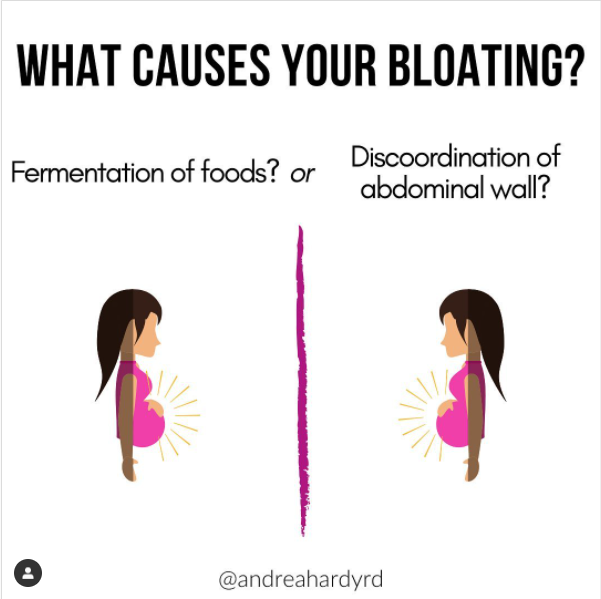
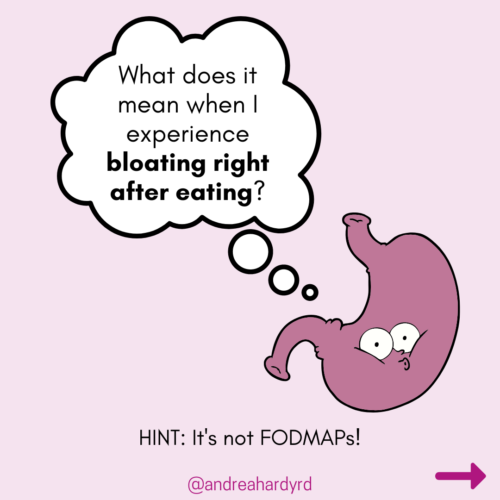
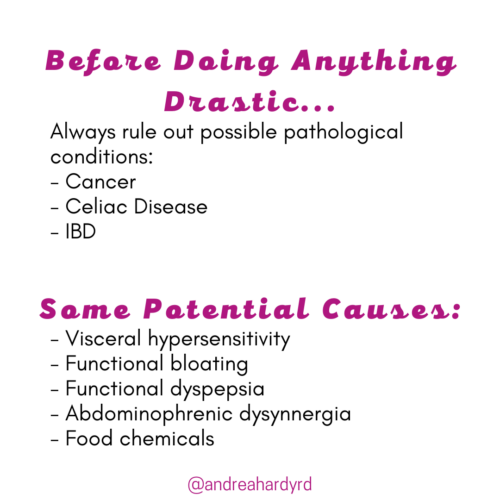
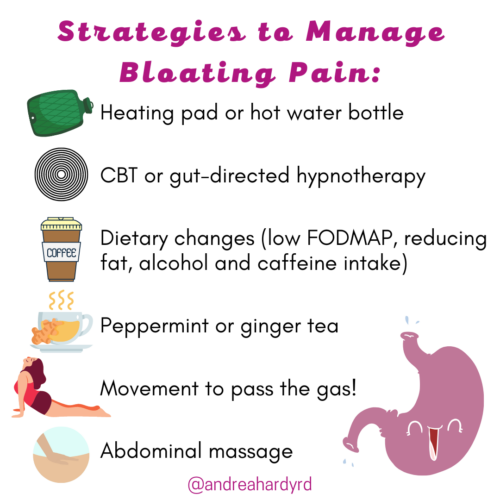
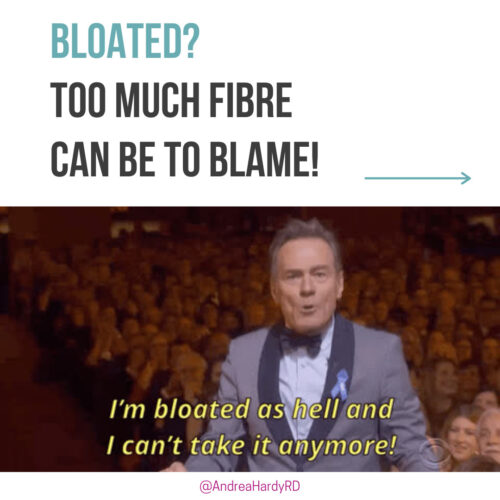
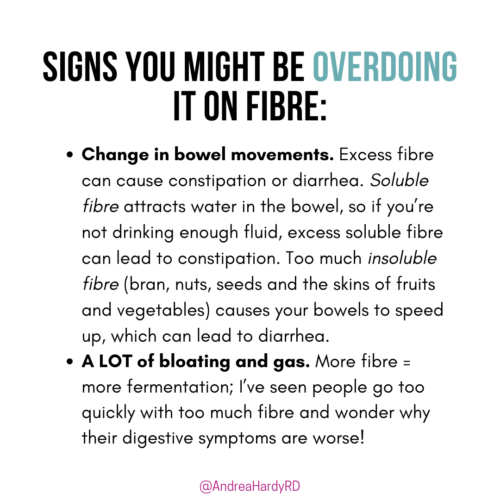
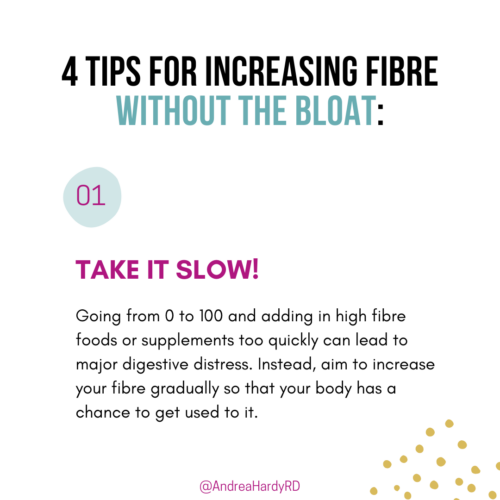
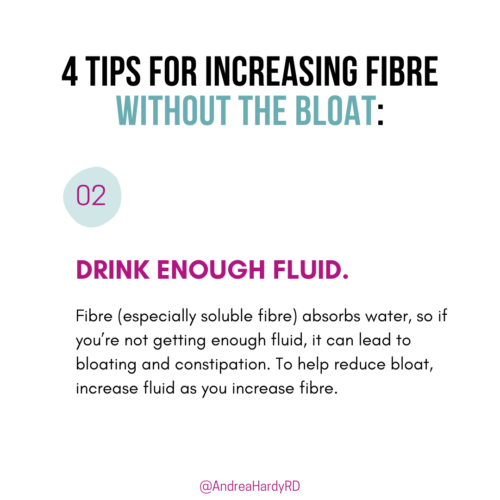
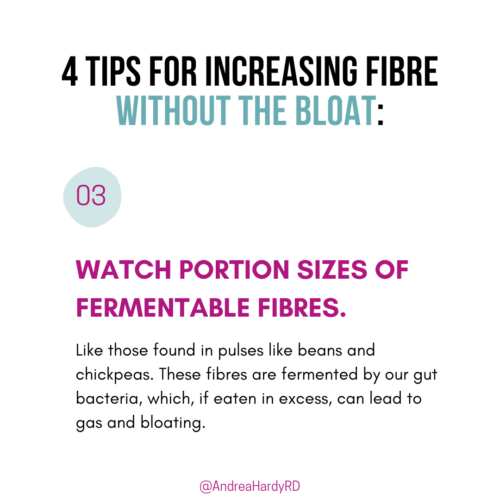
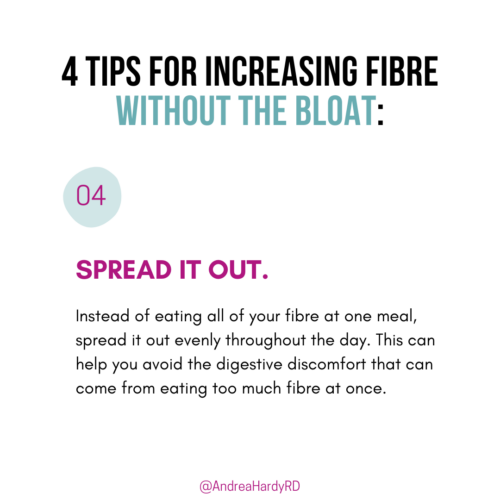
Recent Comments